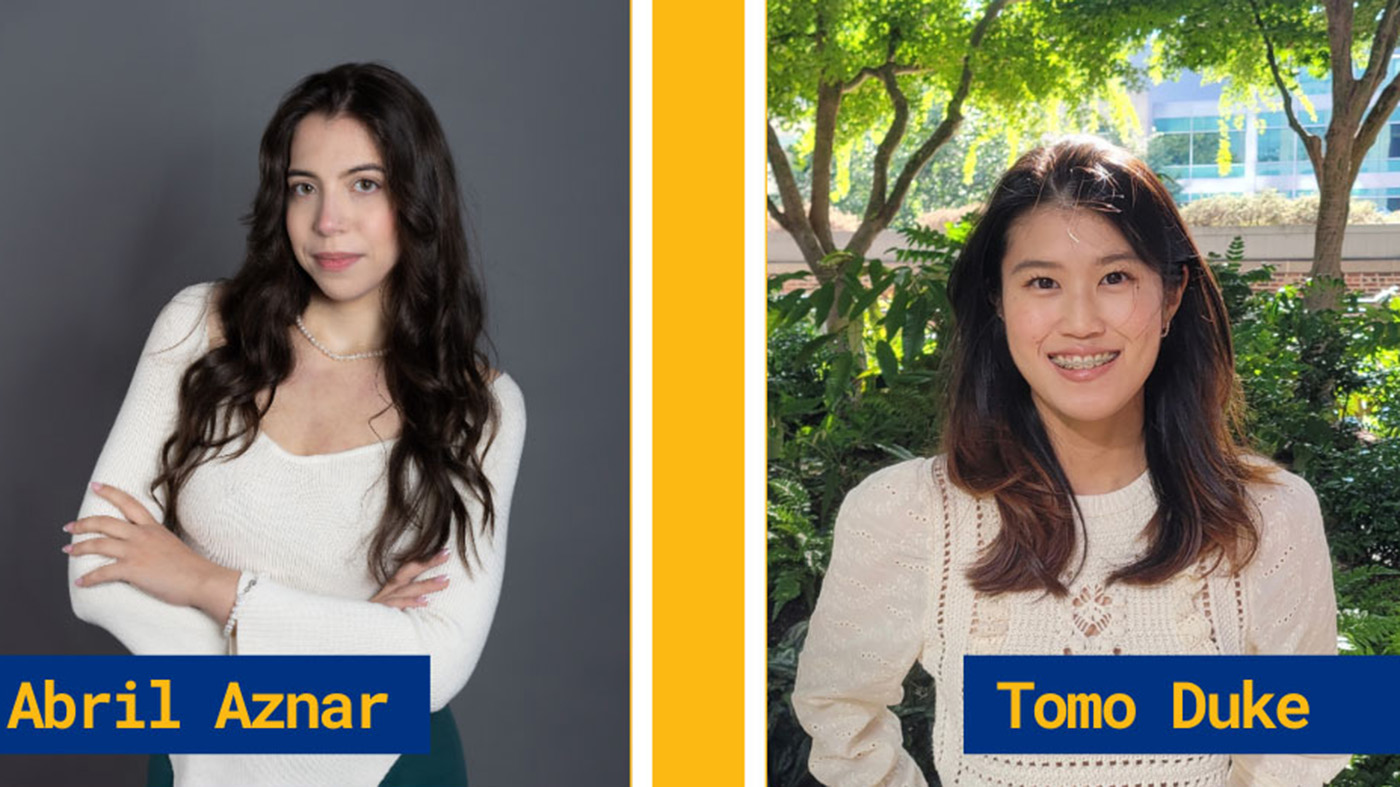Those who wish to immigrate to the United States often face some of the biggest legal hurdles imaginable, from obtaining the ability to earn a living wage to avoiding deportation, with little access to attorneys. This year’s Scholars for Justice recipients are using their own backgrounds as immigrants as inspiration to help future newcomers gain legal residency, economic stability, and a permanent new home.
The Access to Justice Institute provides full-tuition scholarships to two incoming JD students each year who demonstrate commitments to community service, academic excellence, and a future in public interest law.
Scholars for Justice must take the Pro Bono Pledge to complete at least 100 hours of pro bono work before graduation. Additionally, they must maintain at least a 3.0 GPA, seek out volunteer and leadership opportunities, and commit to working in the public interest area of law for at least one year within three years of graduation.
Abril Aznar ’27 immigrated to the U.S. from Buenos Aires, Argentina, as a child. Her family, who moved frequently for fear of being deported, eventually settled in Yakima. There, working in the fields with other immigrants, Aznar discovered a common bond.
“I came to the realization of what it meant to be undocumented, to overcome those struggles. I saw my story echoed in the community,” she said. “I heard the same story on repetition, the search for the American Dream, but it seemed to be elusive for everyone. I was frustrated by the lack of pathways for citizenship.”
While studying sociology and political science at Washington State University, Aznar coordinated and volunteered with high school outreach programs to expand access to information and resources for higher education for Latinx and undocumented students across Washington. After graduation, a similar program helped demystify law school and the legal profession for Aznar, the Law School Admission Council (LSAC) Prelaw Undergraduate Scholars (PLUS) Program, which included a visit to Seattle U Law.
“As a first-generation student, the law school application process is extremely overwhelming. Seattle U Law was incredibly helpful, always present, determined to make a difference and help support the ‘legal desert’ that we have in Yakima,” Aznar said.
Consistent with the program’s goal, Aznar plans to return to the Yakima Valley with her law degree to provide critical bilingual and culturally competent legal aid for a community currently lacking in attorneys.
“I’m excited to learn, come back, and effect so much transformative change,” she said. “I love my community, I could never fully repay Yakima for what it’s done for me. I know it will never completely match what I’ve gained, but if I can give them even a fraction of what I’ve received, it would be a start toward what I hope to give back.”
In the meantime, she intends to keep volunteering at the immigration clinics in the Yakima Valley alongside Seattle U Law faculty, staff, and students, as well as with the dog rescue she and her sister started. Pro bono opportunities with nonprofits such as Northwest Justice Project and Central Washington Legal Aid are also on her radar.
“Community service is an inherent aspect of my life, woven into my desire to do things. If I’m not doing public service, there’s an empty part of me,” she said. “I appreciated seeing how dedicated Seattle U Law was to the cause. It’s not often that I hear schools actively try to contribute to a solution.”
Tomo Duke ’27 was just 16 when she moved to the U.S. from her native Japan to attend high school in New Mexico. The experience was the first time she felt like an outsider.
“That really shaped how I see the world and was the starting point to learn about the systemic and social challenges that minority and marginalized communities will face,” she said.
She decided to study law while earning a master’s degree at Duke University Divinity School and, later, working as a hunger advocacy fellow at Faith Action Network, a multi-faith, statewide policy advocacy organization.
“I focused my theological education on political and public theology, how we could use a theological framework to bring about justice,” she explained.
Duke, who was raised with a mix of Christianity, Buddhism, and Japanese Indigenous religions, and now identifies as a Methodist, said her faith is tied to her “passion and connection to serve others.”
Her extensive community service background includes working with an ecumenical organization advocating for the rights of immigrant farm workers, spending a summer in Tijuana, Mexico, helping feed and find employment for people in migrant camps, and working with faith-based immigrant and refugee resettlement agencies in Washington, D.C.
“I appreciate how Seattle University emphasizes the Jesuit values, it’s really important to look at the history and mission that developed an institution,” she said. “I’m glad to be able to connect with the school’s mission. It gives me a deeper meaning for studying the law.”
She looks forward to engaging in immigration-related pro bono work during law school, possibly with One America. Immigration is an area in which she sees herself working, perhaps intersecting with another type of law such as family law or technology law.
“When I immigrated to the U.S., I had to find the communities where I was able to feel safe and belonging. Those communities were often people of color, immigrants, and refugees,” Duke said. “I connect with the experiences of people who feel like they don’t perfectly belong. I hope I can use my legal education to create the values that extend to those communities who are often neglected.”

